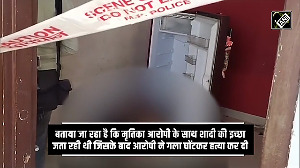 Aiming at an annual 10 per cent growth, Prime Minister Manmohan Singh on Tuesday said investment in infrastructure sector should be doubled to an ambitious $1 trillion (Rs 45.6 lakh crore) during the 12th Five-Year Plan ending 2017 from the current level.
Aiming at an annual 10 per cent growth, Prime Minister Manmohan Singh on Tuesday said investment in infrastructure sector should be doubled to an ambitious $1 trillion (Rs 45.6 lakh crore) during the 12th Five-Year Plan ending 2017 from the current level.
Asserting that a successful infrastructure development strategy would depend critically on implementation, he said, "I urge the finance ministry and the Planning Commission to draw a plan of action in achieving this level of investment."
He underscored the need for private participation for achieving the $1 trillion investment target, which is four times than that in the 10th Plan and double from the 11th Plan, but said lack of financial viability of many of the projects could come in the way.
"The central government has dealt with this problem by offering a capital subsidy, which is completely determined through the bidding process," he said, adding that this viability gap funding process could be accessed by states as well.
Singh said a growth rate of 10 per cent, though ambitious, was not impossible and would hinge on "continual improvement in our policy regime and our implementation procedures."
The huge investment of $1 trillion is a tad lower than the current size of Indian economy.
The prime minister exuded confidence in the Indian economy saying it would grow by 8.5 per cent next fiscal and 9 per cent a year later against 7.2 per cent estimated in the current fiscal.
"I believe that we need to do even better. For eliminating poverty and providing productive employment for our young population in the near future, we must aim at accelerating the pace of economic growth to about 10 per cent per annum," he said at the inauguration of Conference on Building Infrastructure: Challenges and Opportunities.
After growing at over 9 per cent in the three preceding year, India's economic growth declined to 6.7 per cent last fiscal due to the global financial crisis.
However, due to the three fiscal stimulus packages given by the government to prop up the economy, the Central Statistical Organisation (CSO) has estimated economic growth at 7.2 per cent in the current fiscal.
"These rates are well above what is seen in the developed worlds, and reflect the underlying strengths of our economy," he added.
Singh said, double-digit growth would not happen automatically and would require infrastructure development across the country to make it inclusive.
He said power sector is crucial for fuelling the 10 per cent growth, while outlining the growth drivers for the sector.
"The capacity addition achieved already in the 11th Plan period is much higher than the achievement anytime in the past. But we have made less progress in this area than we should have," the prime minister said.
Power shortages remain a problem in many parts of the country and the distribution segment, which is entirely in the states, continues to be fragile, he added.
The prime minister said: "Let me begin by clarifying that when I say infrastructure, I do not mean only infrastructure for the modern part of our economy. For truly inclusive growth, we need to meet the infrastructure needs of the whole country. Infrastructure must therefore be defined broadly to include highways and roads of all kinds including rural roads, railways, air and water transport, irrigation, electric power, telecommunications, water supply and sewerage system."
"Our experience shows that private participation in infrastructure development is indeed a feasible proposition and can help expand infrastructure much faster than it would have relying only on public resources. The telecom sector is the most compelling example of this proposition," he said.
However, he agreed that it was not very easy to get the private sector excited about some infrastructure projects. "One of the reasons why it is difficult to attract private investment in infrastructure is that all projects may not be able to generate adequate revenue streams. The projects may have high economic rates of returns but may not be financially viable," he said.
"The central government has dealt with this problem by offering a capital subsidy which is competitively determined through the bidding processes. Since the capital subsidy is only a proportion of the total capital cost, government resources effectively leverage a large volume of private resources. This Viability Gap Funding arrangement can be accessed by state governments as well. The scheme has been received well and a large number of PPP projects have been approved under this scheme," the prime minister said.






 © 2025
© 2025